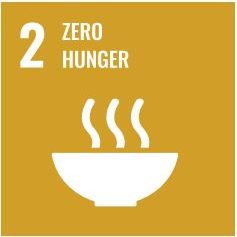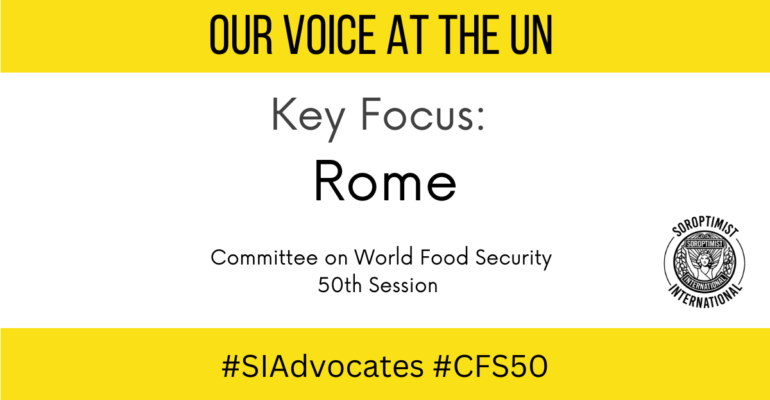This Edition of Our Voice at the UN follows the activities of SI UN Representative Liliana Mosca, as she recounts her experience advocating for the rights of women and girls at two international events coordinated by the UN Food and Agriculture Organisation in Rome.
Headquartered in Rome, Italy, are three important and thematically related UN Agencies; specifically, the city is home to the UN Food and Agriculture Organisation (FAO), the World Food Programme (WFP), and the International Fund for Agricultural Development (IFAD).
Considering the complementary mandates of these agencies, i.e. the common goal of eradicating hunger through food assistance, as well as the transformation of global agriculture and food supply systems in line with Sustainable Development Goal 2: Zero Hunger, these UN agencies serve as a critical pathway for SI’s UN Representative in Rome, Liliana Mosca, to promote and advocate for the role of women in transforming rural economies and food systems – by making them more inclusive, productive, resilient, and sustainable.
The Commission on World Food Security (CFS) is an intergovernmental body which serves as a forum within the United Nations; primarily, the committee operates as the foremost inclusive international and intergovernmental platform, coordinating the efforts and input of stakeholders in the review and follow-up of policies concerning world food security – including production, supply, and economic access to food. Usually convening for an annual Plenary session every October at the FAO in Rome, the committee delivers a full schedule of side events and speakers, discussing the content, updates, and findings within the latest State of Food Security and Nutrition in the World report (SOFI).
CFS 50 – ‘Global Responses to a Global Food Crisis – Leaving No One Behind’
From 10 to 13 October 2022, SI UN Representative Liliana Mosca participated remotely as a delegate for the Civil Society Indigenous Peoples’ Mechanism (CSIPM), attending the 50th Session of the Committee on World Food Security (CFS50).
 >>> Day One – Coordinating Policy Responses to the Global Food Crisis
>>> Day One – Coordinating Policy Responses to the Global Food Crisis
‘The first day was dedicated to “Coordinating policy responses to the global food crisis – The State of Food Security and Nutrition in the World 2022” (SOFI). The SOFI indicates that as many as 828 million people were affected by hunger globally in 2021. This is an increase of 46 million people since 2020, and 150 million since the outbreak of the COVID-19 pandemic.
Stemming from this theme, the Keynote speakers, as well as the National, Regional, and other participants’ all agreed the following in their statements:
1) We must act to ensure food for all people
2) That it is extremely vital to transform the global and national agrifood systems,
3) That it is necessary to work together to make the difference.
In his opening remarks, Gabriel Ferrero, CFS Chairperson, noted that the realisation of people’s inalienable right to adequate food is in jeopardy and called for urgent action to address current food crisis, coupled with long-term transformative efforts to ensure sustainability.
“Coming at time of the worst systemic, multi-layered, food, cost-of-living, and human development crisis, CFS 50 will be critical for advancing urgent and coordinated global policy responses in support of country-led solutions,” ~ Gabriel Ferrero, Introducing the Focus of CFS50
>>> Day Two – Empowering Women and Girls and Promoting Gender Equality
The second day was dedicated to “Empowering Women and Girls and Promoting Gender Equality”. The discussions on this date centred around the preparation of updates to the CFS Voluntary Guidelines on Gender Equality, as well as Women’s and Girl’s empowerment in the context of food security and nutrition. Additionally, coinciding with talks on this day was the International Day of Rural Women – the commemoration of which features as part of some of the discussions.
Ultimately, no agreement was reached on the draft text of the Voluntary Guidelines on Gender Equality and Women’s and Girls, due to the opposition of: Indonesia, China, Russia, Egypt, Morocco, Malaysia, the Holy See, Sudan, and Cameroon. They contested the “multiple intersecting forms of discrimination,” “sexual and gender-based violence,” “women and girls in all their diversity,” “sexual and reproductive health and reproductive rights,” “sexual orientation,” “gender identity,” and “an intersectional approach to gender.” It was agreed that Voluntary Guidelines on Gender Equality and Women’s and Girls” will be submitted to consideration and endorsement at CFS 51.
The fourth item on the agenda was the “CFS Strategic Direction toward 2030”. This was the occasion for reviewing the work of CFS, to accelerate action on the second Sustainable Development Goal (End hunger), and to present comments on the report issued by the High Level Panel of Experts on Food Security and Nutrition (HLPE-FSN), toward 2030.
Following this, item number five on the agenda was on “Data Collection and Analysis Tools for Food Security and Nutrition”. The session provided the plenary with the opportunity to discuss the relevant policy findings of the CFS HLPE-FSN Report.
>>> Day Three – Empowering Youth in Inclusive and Sustainable Food Systems
On the third day, the sixth item of the agenda, “Empowering youth in inclusive and sustainable food systems” was raised for discussion. The CFS plenary endorsed the Policy Recommendations on ‘Promoting Youth Engagement and Employment in Agriculture and Food Systems for Food Security and Nutrition’. There was recognition among the plenary that “Investing in young people and strengthening their participation in decision-making processes, including through enhanced and equitable access to resources, is key to contributing to food security and nutrition, poverty eradication, employment generation, sustainability and resilience of agriculture and food systems.”
 Item number seven on the agenda was “Boosting Responsible Investment in Sustainable Agriculture and Food Systems through a Global Thematic Event on the CFS Principles for Responsible Investment in Agriculture and Food Systems”. The event highlights the important need to boost financing for sustainable development and access to resources for actions and efforts to achieve SDG 2 by 2030, in line with the integrated and indivisible framework of the 17 SDGs.
Item number seven on the agenda was “Boosting Responsible Investment in Sustainable Agriculture and Food Systems through a Global Thematic Event on the CFS Principles for Responsible Investment in Agriculture and Food Systems”. The event highlights the important need to boost financing for sustainable development and access to resources for actions and efforts to achieve SDG 2 by 2030, in line with the integrated and indivisible framework of the 17 SDGs.
On conclusion, the 50th session of the CFS ended up being particularly disappointing and frustrating for the first time. Negotiations were stuck and solutions are not in sight.’
More information on this event can be found on the FAO webpage for CFS 50.

World Food Day 2022: Call to Leave No One Behind
On 16 October 2022, the FAO celebrated World Food Day by recognising the achievements of those whose actions and efforts are transforming global food systems. SI UN Representative in Rome, Liliana Mosca, recounts her experience participating in this event.
‘The many statements released on 16 October at the 2022 World Food Day event, “Leave No One Behind”, have highlighted a deteriorating global food security crisis, as well as all-time high numbers of people at risk of experiencing serious levels of hunger in Asia and Africa.
Food systems and global food security are at a critical moment. The effects of a global pandemic have resulted in major disruptions to supply chains and have destabilised food systems internationally; additionally, armed conflicts, such as the war in Ukraine, are driving unconscionable levels of hunger as violence prevents food from reaching those who are most in need.
In light of droughts in the Horn of Africa, floods in Pakistan, and the fact that parts of Somalia are at risk of famine for the second time in just over a decade, we are also seeing how climate change poses a serious threat to our food supply. Furthermore, an increase in energy and fertiliser prices has also majorly restricted the availability of such resources for use in food production; the combined effects of these issues has now meant that global food insecurity has been severely amplified, especially for the most vulnerable people and nations.
The impact of food insecurity on persons across the globe is deplorable. On top of the 970 000 people at risk of famine in Afghanistan, Ethiopia, Somalia, South Sudan and Yemen, the number of people facing hunger worldwide is on the rise (as much as 828 million in 2021, according to the Food and Agriculture Organisation’s (FAO) latest ‘The State of Food Security and Nutrition in the World’ report) and 3.1 billion people still cannot afford a healthy diet.
In all the messages from key international figureheads on World Food Day 2022, including those from leaders such as: Qu Dongyu – FAO Director General; Pope Francis; Sergio Mattarella – President of the Italian Republic; António Guterres – UN Secretary-General; Alvaro Lario – President of the International Fund for Agricultural Development (IFAD); to David M. Beasley – Executive Director for the World Food Programme (WFP), the importance of working together, to overcome the global food security challenges that we are currently facing, was emphasised throughout.
In particular, arising from this international event, there are prominent calls for an increased effort toward global solidarity; to transform agrifood systems in a bid to foster inclusive economic growth, address inequalities, increase resilience, and achieve sustainable development for a world where everyone, everywhere has regular access to enough nutritious food.
The ceremony also presented awards to people whose actions and efforts are transforming agrifood systems, with the FAO presenting its first-ever achievement awards in sectors such as fisheries, forestry, climate, land and water, as well as in animal and plant health. These awards were conferred to individuals, including FAO teams or employees, for outstanding technical cooperation or humanitarian work at country level, as well as entities – for instance, the first-ever FAO Achievement Award was handed to the Kirisia Community Forest Association (CFA) in Kenya, for their successful restoration of the Kirisia forest.
More information on this event can be found on the FAO webpage for World Food Day 2022.
You can also read our SI position papers on Food Security and Rural Women on our website.

